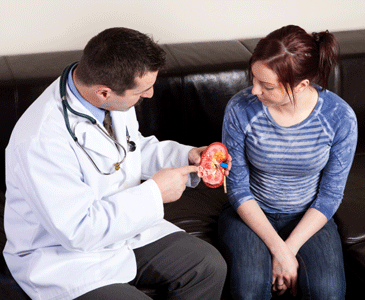A new website is launched today that will help bridge the communication gap between healthcare professionals and patients diagnosed with mild chronic kidney disease (CKD) after research revealed a disparity between what GP's explain and what patients understand about the condition. The resource has been developed by University of Bristol academics.
The www.healthtalk.org/kidney-health site, which has been launched today [12 Mar] to coincide with World Kidney Day, features video clips from interviews with patients and health professionals talking about their experiences of early-stage CKD.
It has been developed and created by researchers at the universities of Bristol, Oxford, Manchester and University College London together with representatives from the British Kidney Patient Association and the Kidney Patient Guide as part of the NIHR School for Primary Care Research-funded ESKIMO study (Experiences of kidney monitoring in primary care).
Researchers interviewed 45 patients and 22 primary care health professionals to understand patients' and health professionals' experiences of early-stage CKD. They found that GP's attempting to reassure patients that their kidney impairment was nothing to worry about, without providing explanatory information about the condition, could leave patients concerned. Patients wanted to know more about possible causes, the meaning of test results, and whether they could do anything to prevent further decline.
Professor Gene Feder, a GP and Professor of Primary Care at the University of Bristol's Centre for Academic Primary Care in the School of Social and Community Medicine, said: "Clinicians often avoid using the term 'CKD' when talking to their patients with early-stage kidney impairment in an attempt to avoid causing unnecessary anxiety. Use of words like 'kidney damage' or 'kidney failure' can be quite frightening, and the term 'chronic' was sometimes misinterpreted as meaning serious, whereas a description of the decrease in kidney function as a percentage or stage seemed to be less alarming. However, the exact meaning of the test results was often unclear and those who were told their CKD stage didn't always understand what this meant."
On the website patients can view video clips from interviews with people talking about their experiences of early stage CKD and learn about why kidney performance may begin to decline and who is at risk, how kidney performance is measured and why it is important to check it regularly. Patients can also learn about how people find out that they have early signs of kidney problems, their experiences of having regular check-ups, their information preferences, and the ways in which they try to look after their health.
For health professionals, the website provides an insight into the experiences of people who are being monitored for early signs of kidney problems – what information they have received, what they found helpful and unhelpful, their key questions and concerns, and their views on how monitoring could be made more meaningful to them.
Dr Jeremy Horwood from the University of Bristol's Centre for Academic Primary Care in the School of Social and Community Medicine was lead researcher on the project. He said: "The kidney health section of the healthtalk website provides a valuable resource for both patients and doctors to support and inform people going through similar experiences. The video clips are also a great, free resource for teaching and training to improve understanding of how patients view and experience the diagnosis and management of early stage chronic kidney disease."
Provided by University of Bristol


















